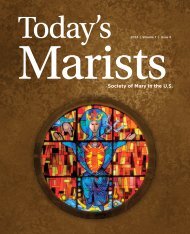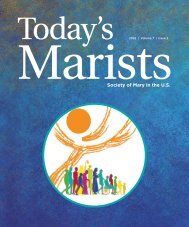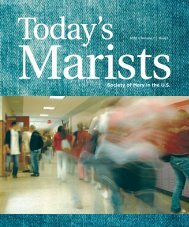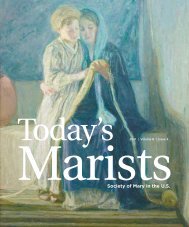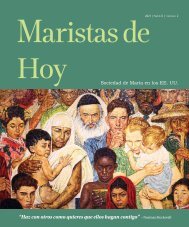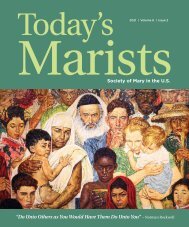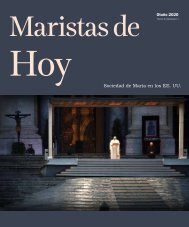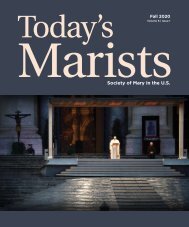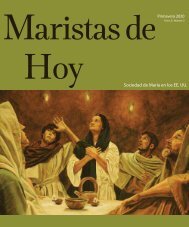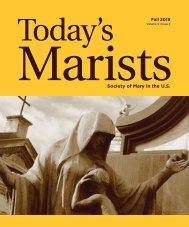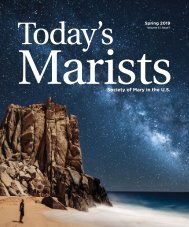Today's Marists 2024 Volume 8, Issue 2
Create successful ePaper yourself
Turn your PDF publications into a flip-book with our unique Google optimized e-Paper software.
NDP Middle School Reconciliation service<br />
at St. John Fisher Parish<br />
Students Embrace the<br />
Openness<br />
In light of what many Catholics - especially<br />
those in the Church hierarchy - think is a<br />
“confession crisis,” how do young people of<br />
faith feel about this part of their still “newish”<br />
spiritual journey? And how do they feel<br />
about its sacramental ritual - whether in a<br />
confessional or face-to-face?<br />
Della Lawrence is the director of campus<br />
ministry at Notre Dame Preparatory School<br />
(NDP). She shared that in her 12+ years<br />
in campus ministry at NDP, she cannot<br />
remember any student requesting a private<br />
setting for confession.<br />
“The students are always receptive to faceto-face,”<br />
she said. “We’ve never had a student<br />
actually ask for something different. I also<br />
am quite confident in saying that even in<br />
most parishes, even when my own kids were<br />
learning to receive the sacrament, it was<br />
always face-to-face.”<br />
Lawrence said especially during the season<br />
of Lent, campus ministry continues to<br />
provide a myriad of reconciliation services<br />
for NDP students in third through 12th<br />
grade.<br />
“We brought our third, fourth and fifth<br />
graders over to the main school campus<br />
and did a prayer service with them, and<br />
inside that prayer service is the Sacrament<br />
of Reconciliation,” she said. “Students are all<br />
encouraged and invited to go to confession -<br />
those who are Catholic, of course.”<br />
She said that those who are not Catholic<br />
are told they can meet with the priest for a<br />
blessing.<br />
“It’s really an invitation, an invitation for<br />
them to really understand and know what<br />
the process is, that it is an internal reflection,”<br />
she said. “Right from the beginning, we’re<br />
talking to the kids at all ages about the<br />
sacrament. And they also talk about it in<br />
religion classes, even the pre-K through<br />
second grade students.”<br />
Spiritual Retreats Provide<br />
Opportunities<br />
At the other end of the age spectrum at<br />
NDP is Chanel Issa, a 12th grader looking<br />
forward to graduation in May. For her,<br />
reconciliation means more than simply<br />
seeking forgiveness.<br />
“For me, the Sacrament of Reconciliation<br />
means still another way of connecting with<br />
those who you have established relationships<br />
with over the years, especially now that I’m<br />
graduating high school,” she said. “I want<br />
to strengthen those relationships with my<br />
family and with my friends, and I feel like the<br />
idea of reconciliation, the process of seeking<br />
forgiveness and forgiving others and making<br />
sure that you’re still keeping in touch with<br />
others is pretty pivotal, especially since it’s<br />
my senior year.”<br />
Issa said that school retreats also provide<br />
an opportunity in a more intimate setting to<br />
“reconcile” with her fellow classmates.<br />
“I loved going on our retreats and I feel<br />
like they really helped with rekindling<br />
friendships that maybe weren’t quite as<br />
strong in the past,” she said. “Opening<br />
yourself up to God and seeking<br />
reconciliation also opens your relationships<br />
with friends as you seek reconciliation with<br />
them.”<br />
Nolan Tompkins, Issa’s 12th-grade<br />
classmate, has a different take on the<br />
Sacrament of Reconciliation, perhaps a bit<br />
more traditional.<br />
“For me, the sacrament means a lot,” he said.<br />
“Because we are human, we tend to mess up<br />
a lot and sometimes move away from God<br />
and reconciliation just reminds me that God<br />
loves me no matter what I do.”<br />
“God will always forgive me, as long as<br />
I bring my sins to the priest and confess<br />
everything and I feel sorry for my sins,”<br />
he said. “I’m still a child of God, and<br />
reconciliation just gives me a chance to<br />
reunite with God.”<br />
A Calming Effect<br />
During this interview, Lawrence was in the<br />
middle of organizing reconciliation services<br />
for NDP’s middle schoolers. Each year,<br />
she sets up a day at nearby St. John Fisher<br />
Chapel University Parish, which serves as<br />
the Catholic campus ministry for Oakland<br />
University a few miles east of Notre Dame<br />
Prep.<br />
“We usually have 8 to 10 priests on hand<br />
for about an hour and a half,” she said.<br />
“Nowadays, it’s a little difficult to get that<br />
many priests to be able to devote the same<br />
hour and a half. But we begin working on it<br />
at the start of the school year.”<br />
She said that other area schools are now<br />
following this same format for reconciliation<br />
services.<br />
Lawrence shared, “We even have an<br />
alumnus from NDP, Fr. Eric Fedewa (Class<br />
of 2000), who is pastor at St. Basil the Great<br />
parish in Eastpointe, Michigan, to help us<br />
out.”<br />
According to Lawrence, they take over the<br />
entire complex at St. John Fisher for the<br />
reconciliation service.<br />
“Every classroom - and they have a lot of<br />
different classrooms - has a priest whether<br />
it’s upstairs or downstairs,” she said. “And we<br />
have seats and chairs and waiting spaces for<br />
continues on page 21<br />
<strong>Volume</strong> 8 | <strong>Issue</strong> 2 19




